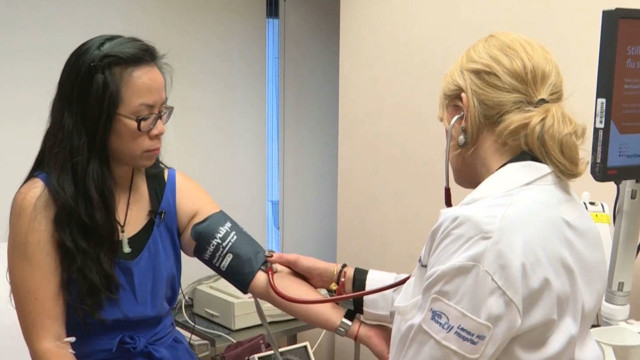High blood pressure has been called the silent killer. It’s a leading cause of death worldwide, but sufferers often have no symptoms.
U.S. health experts have just expanded the guidelines for treatment, in hopes of saving more lives. CGTN’s Karina Huber reports.
Forty-six-year-old Chi-Chi Bestmann has high blood pressure. It was triggered by her first pregnancy nine years ago but there’s also a genetic component.
“My parents both have it,” she said. “My younger brother has it. So I think it’s kind of hereditary.”
As a working mother to two children, she also has a hectic life. Stress is a contributor to high blood pressure. Over the years, she’s managed to stabilize things through medication but in recent months, her blood pressure has gone up.
“It makes me anxious and really irritable, I should say, when my blood pressure is high. I can feel it. I can really feel it and it’s like something takes over me, and I don’t like that feeling, ” Bestmann said.
In the past four decades, the number of people with high blood pressure has almost doubled to over a billion globally. The numbers could be even higher as many don’t know they have it.
“We call it the silent killer. You cannot feel it and you do not know you have high blood pressure, unless you get it checked, ” cardiologist Suzanne Steinbaum said.
High blood pressure or hypertension can lead to heart attacks, strokes and severe kidney disease. The World Health Organization estimates it kills 7.5 million people annually.
A recent study showed more than half of adult cases are in Asia. China has 226 million people with high blood pressure. India has 200 million.
In the United States, the numbers are dropping but it’s still the second leading cause of preventable death. Health organizations are working to lower the numbers even further.
For the first time in 14 years, the American Heart Association and ten other groups have lowered the threshold for high blood pressure from a reading of 140 over 90 to 130 over 80. Under the new guidelines roughly 46 percent of U.S. adults will be considered hypertensive.
The change comes after a large-scale study in 2015 that shocked the medical community. It found that the risk of life-threatening conditions begins at a reading of 130 NOT 140. An ideal reading is 120 or below.
“When the blood pressure goes from 120 to 130, there is a twofold increase in risk of heart disease and stroke,” said Dr. Steinbaum. “So getting that number down to 120 decreases your risk by half. That’s quite significant.”
Dr. Steinbaum said the first line of defense is lifestyle changes – like increasing exercise, diet and stress management. Those at higher risk should go on medication.
“So if you get on high blood pressure medication, it doesn’t mean it’s forever,” said Dr. Steinbaum. “It means it is something to help you get to a healthier place. But the most important piece of it is – no matter what – whether it’s through lifestyle or whether it’s through medication, to get that number to 120 over 80.”
Bestmann checks her blood pressure several times a day. She said it it’s on her mind all the time for good reason.
“I want to be there for my children,” Bestmann said. “They’re still young, seven and nine, you know. So I want to make sure I’m healthy so I can do more things.”
Dr. Steinbaum said the best way to avoid potentially getting a heart attack or stroke is to get your blood pressure checked and take it from there.
 CGTN America
CGTN America

